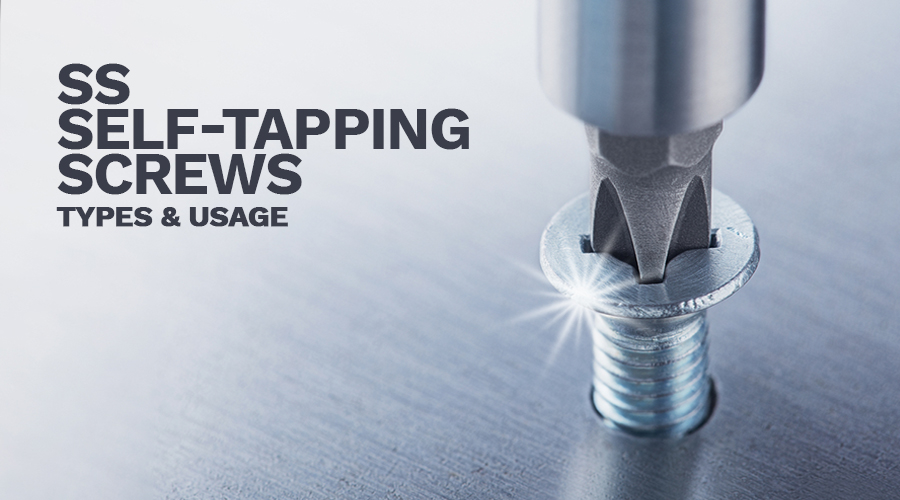


In the world of fasteners, there are more than a hundred types of screws available in the market.
Screws available in the market come in different sizes, materials, specifications and purposes. One such type of screw available in the market is SS Self Tapping Screws, also known as Self Threading screws.
What are self-tapping screws & what makes them stand out from other screws? Well, the answer lies in the name itself. These screws eliminate the need of drilling holes before installation, they are designed to carve their own hole as they are fastened into the material.
To sum it up, it is a screw that taps its own hole while being drilled into the material which can be plastic, metal or wood.
SS Self Tapping Screws are largely being preferred by handymen lately because of their efficiency and ease of use. Plus fitting a SS self-tapping screw takes lesser time when compared to a regular fastener.
The reason why SS self-tapping screw takes less time is that it eliminates the step of drilling a hole. This saves time & gets the job done quicker.
Screws aren’t the only way to fasten objects together. For fastening one or more pieces of light to heavy gauge sheet of metal, adhesive & riveting can be used.
If the application process consists of fastening an excess amount of sheets together, then going with the SS self-tapping screws is the best option as they are quick, sharp & have a tight grip.
There is more than one category for SS Self-Tapping Screws. Each category is differentiated from others on the basis of purpose, strength & threads.
It is important to know the difference between the 5 kinds of self-tapping screws available in the market to choose a screw that is perfect for your project.
Also not being able to choose the right kind of screw for the project, will end up failing the screw & damaging the material.
Screws from this category form their threads while being pierced through the material. This feature helps them to form a tight grip on the material as the threads are formed through the friction between the screw & the material.
These screws are preferred when the material in use is a 1 to 2-layer thin gauge.
This is the best choice if the job material is thick & hard. The tip of the self-drilling screw is sharp and can easily pass through the surface without the need for a pilot hole.
A pilot hole is a small hole drilled at a point on the surface of the object where the screw is supposed to be fitted. The place of the pilot hole is to guide the way to the screw.
Helpful in piercing and fastening through the material placed at a sharp angle. These screws are super sharp and pierce through the object quickly.
One should be careful while working with them.
Like Self drilling screws, thread-tapping screws also don’t require a pilot hole before fitting, because they can form their own pilot hole by removing the material particles from the way & making space for the screw.
While the application of Thread Tapping Screw makes sure that the pilot hole is smaller than the diameter of the screw.
It is commonly used for plastic surfaces and requires a pilot hole so that it can easily make its way through the surface.
Even though its tip is a bit blunt, its threads are designed to grip the material tightly.
Also do not over-tighten the screw as the grip can cause the material to collapse.
Metal sheets are used for the framing of so many objects, from automobiles to machinery.
While dealing with metal on a large scale production and a tighter grip, self-drilling screws are required.
Government uses SS Self Tapping Screws for connecting the drainage pipes. The reason is the reliability of the SS Self Tapping Screws.
Not only the SS Self Tapping Screw takes less time to fit and secures the material tightly but it also shows resistance against corrosion caused by water.
So these were the types & uses of SS Self-Tapping Screws, if you want to explore quality stainless screws for your upcoming project, be it for building furniture or assembling a ship, you can find quality screws here.